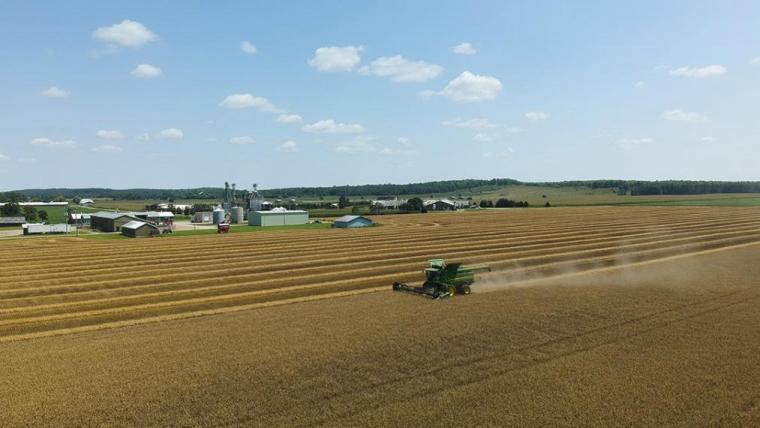
The Ontario Agri-Food Innovation Alliance has opened its call for project proposals focused on mobilizing knowledge and engaging partners in agri-food research.
The Knowledge Translation and Transfer Funding Program [1] is designed to build and amplify the positive impacts of agri-food and rural research. It’s integral to the Ontario Agri-Food Innovation Alliance, the collaboration between the Government of Ontario and the University of Guelph, and its commitment to ensuring the benefits of agri-food research are available to the sector and rural and Indigenous communities.
“Our government knows the importance of supporting research and innovation for our agri-food sector and that it depends on effectively translating research into results for Ontario’s farmers and food processors,” said Lisa Thompson, Minister of Agriculture, Food and Rural Affairs. “Initiatives such as the Alliance Knowledge Translation and Transfer (KTT) Program help the sector move innovative solutions into action, to meaningfully boost the sector’s competitiveness and address new challenges.”
KTT builds on a long history of agricultural extension and works to foster early and frequent collaboration between researchers and research users, like farmers, producers, veterinarians and communities.
The KTT Funding Program leverages U of G expertise and collaboration networks to drive innovation and foster new partnerships.
“University of Guelph researchers have a long history of outreach with broad communities and sector partners to share information, build capacity and generate effectual change in many areas of food production,” said Dr. Rene Van Acker, interim vice-president (research) at U of G. “Funding from the Ontario government through the Alliance KTT Funding Program facilitates the transformation of research knowledge into practical solutions, improving the sustainability and competitiveness of the province’s agri-food and rural sectors.”
The Alliance is encouraging applications from eligible University of Guelph researchers for two of its KTT Funding Program streams:
- KTT Mobilization Funding [1] for activities that drive the transformation of research knowledge into use (call open yearly; currently open until February 15, 2024)
- KTT Initiatives Grants [1], which provide up to $5,000 for a product or strategy that translates and transfers research that benefits Ontario’s agri-food sector or rural communities, including pre-research engagement and partnership activities (applications accepted at any time)
KTT funding call builds on program success
The KTT Funding Program has supported mobilization and research initiatives since 2010.
Many completed projects continue to positively impact the sector. For example, past projects have resulted in the development of disbudding pain control training for dairy producers, the evaluation and improvement of ways to reach vegetable growers with integrated pest management strategies, and the creation of 14 beekeeping how-to videos that helped propel the Ontario Honey Bee Research Centre’s YouTube views to over 6.5 million, providing education on specific skills to current and prospective beekeepers.
Eight new KTT projects have started in 2023. These projects are aimed at mobilizing agri-food knowledge, or studying approaches to knowledge translation, and were awarded as part of the spring call.
Among the eight new projects are:
- Towards an Integrated Indigenous Food Security Strategy for Ontario: Supporting Indigenous Food Sovereignty and Agri-Food Initiatives: This project will evaluate successful Indigenous-led food security initiatives to guide local, provincial and regional resource use and identify opportunities for collaboration to support the growth of the agri-food continuum in northern Ontario in an Indigenous-specific context. (Dr. Sara Epp)
- Soil Health Assessment and Planning Capacity Building and Resource Development: This project will develop easy-to-use resources based on the OMAFRA Soil Health Assessment and Planning (SHAP) tool, making it practical to implement, and supporting sustainable soil management practices in Ontario. (Dr. Kari Dunfield)
- Delivering Training to Ontario Fish Farmers and Indigenous Communities for the Culture of Lake Whitefish: This project will create and share best practices for the culture of lake whitefish with fish farmers and Indigenous communities to help expand Ontario whitefish production and contribute to economic development. (Dr. Marcia Chiasson)
- Advancing the Science of Knowledge Translation and Transfer Using a Community-Engagement Approach: Co-Developing Private Water Well Best Management Practice Awareness and Education Materials: This project will update and translate the 2003 Water Wells Best Management Practices book while co-developing research priorities and evaluating how a community engagement approach to collaborate with First Nations, farms and rural communities could enhance our broader understanding of knowledge translation and transfer science. (Dr. Sherri Longboat)
See the full list of funded projects [2] on the Alliance website.
Contact:
Victoria Holla, Knowledge Mobilization Manager
Office of Research, Agri-Food Partnership, University of Guelph
holla@uoguelph.ca [3]
